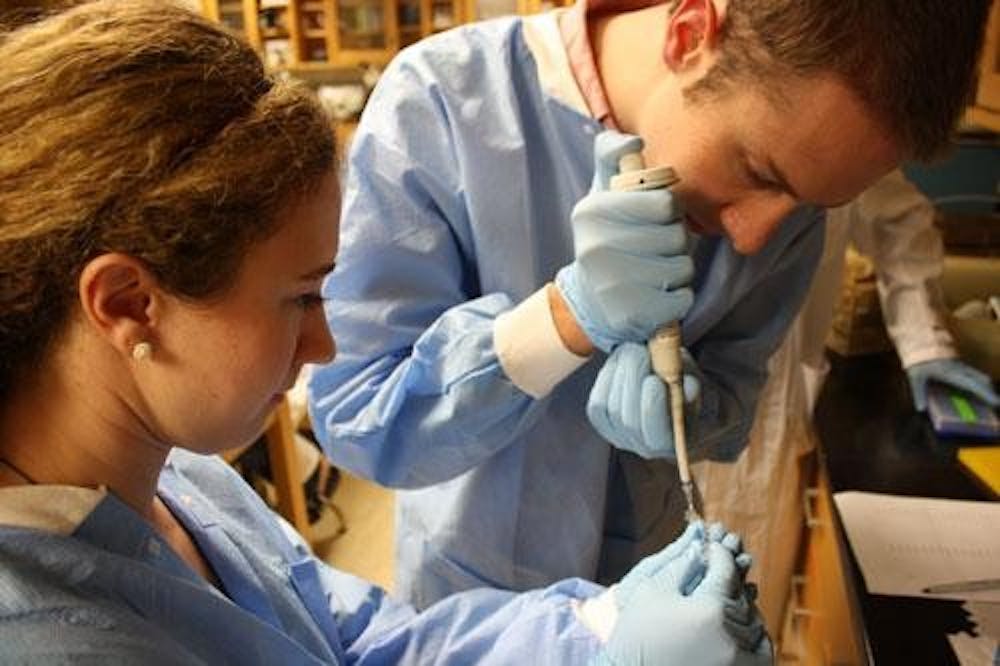
Miami University seniors Nathan Arnett and Bridgette Rawlins research single-celled organisms called protists from Antarctic lake water samples brought back by Assistant Professor of Microbiology Rachael Morgan-Kiss. (Colleen Yates | The Miami Student)
The Miami University Department of Microbiology has high hopes for samples of Antarctic lake water brought back for analysis by Assistant Professor of Microbiology Rachael Morgan-Kiss.
The primary reason for the trip was to investigate microbe-dominated bodies of water in hopes of shedding light on the activity and ecological role of single-celled organisms called protists.
Students in Morgan-Kiss' laboratories have been given the opportunity to perform analysis on the samples of lake water from Antarctica over the past several weeks. Morgan-Kiss said the experience is, "another outlet for students to get real research experience."
Morgan-Kiss is excited with the work and findings of students who have been working with the samples, according to senior microbiology major Austin Duprey, a student in Morgan-Kiss' class.
Duprey said working with the samples has been a rewarding opportunity.
"I think it's pretty neat because we're working with stuff that's relatively new," Duprey said.
According to Morgan-Kiss, using small and relatively isolated Antarctic lakes to study the function of these microbes could help researchers understand the role similar microbes play in larger, more complex bodies of water.
"These organisms are really, really abundant in all aquatic systems all over the world," Morgan-Kiss said. "In these other systems, they are a lot more complex than our lakes. It's been known that these organisms are abundant, but it has been very difficult to understand what they're doing. When organisms are important on such a huge scale they have a big impact, even though they're microbes."
The nature of protists and their role in both large and small ecosystems is complex due to the fact that they are able to play two very different roles within their food web. According to Morgan-Kiss, protists have the ability not only to carry out photosynthesis and fix carbon, like plants, but also to be predatory organisms despite the fact that they are single-celled.
Morgan-Kiss said Miami is specially suited to the kind of work necessary to determine the roles these organisms play in global ecosystems because of its use of a technology called chlorophyll fluorescence, which analyzes in real time the types of algae living in the Antarctic lakes. This can then be used to make hypothesis about the organism's role in the carbon cycle.
Enjoy what you're reading?
Signup for our newsletter
Morgan-Kiss said although the Antarctic lakes are isolated bodies of water, their location on the globe plays an important role in determining the role of microorganisms in larger bodies of water. In addition to researching what roles the protists in these icy bodies of water are currently playing, Morgan-Kiss and her fellow researchers are concerned with the effects of climate change on photosynthetic protists.
According to Morgan-Kiss, the main environmental factors key to the daily operations of protists include temperature, lights and nutrient availability; all of which could be impacted by climate change.
"The lakes we're studying have a higher and higher water flow all the time because of climate change and glacial melting," Morgan-Kiss said. "We know that every year there's a trend. This environment that we work in has a huge group of investigators that have been studying the environment for 30-plus years, so there's a great long-term data set. We know that there's absolutely more water flow into the lakes and it's coming from more glacial melt."
According to Morgan-Kiss, the research students are working on is significant because they are working on independent research projects with samples from external environments that have not been sampled nor cultured very often.
"[Students] get to work with novel samples," Morgan-Kiss said. "They're getting both cutting-edge training in new methods but then they're applying these methods to independent research projects."




